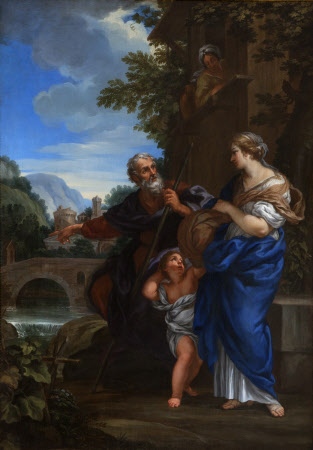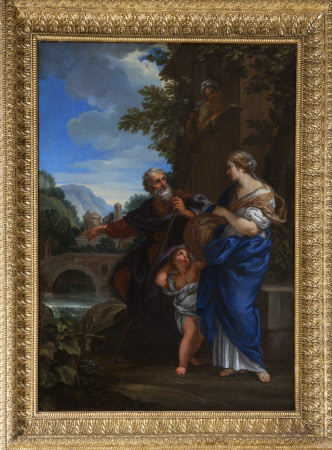Abraham expelling Hagar and Ishmael
Ciro Ferri (Rome 1634 - Rome 1689)
Category
Art / Oil paintings
Date
1669 - 1689
Materials
Oil on canvas
Measurements
1289 x 965 mm (50 ¾ x 38 in)
Place of origin
Italy
Order this imageCollection
Kedleston Hall, Derbyshire
NT 108846
Summary
Oil painting on canvas, Abraham expelling Hagar and Ishmael by Ciro Ferri (Rome 1634 – Rome 1689). This picture represents the moment when Abraham banishes Hagar and their son Ishmael at the behest of his wife Sarah. According to the Old Testament biblical story (Genesis 21: 9-21), Sarah thought she was barren and had given Abraham her Egyptian maid to have children for her, but she could not stand the consequences. Her son Isaac was born and teased by Ishmael so Abraham packs them off into the desert, only this scene shows a rather more verdant landscape with a classical bridge over a river. An apparent copy is in the National Gallery of Ireland, Dublin.
Provenance
Assumed by Stella Rudolph to have been owned by the marchese Niccolò Maria Pallavicini, who did indeed profess himself a great admirer of the artist, and who commissioned a large Coriolanus pleaded with by his mother and wife from him (now at Sans Souci); but not to be found in the posthumous inventory of his chattels in the Palazzo all’ Orso in Rome in 1714; the present picture - but not its pendant – first recorded in 1728, in F.S. Baldinucci’s Vita of Ferri (ed. A. Matteoli, 1975, pp.139 & 146), as one of three paintings by the artist in the Florentine palazzo of Pallavicini’s heir (and apparently illegitimate son) cavaliere (later marchese) Tommaso Niccolò Maria Arnaldi (though palazzo and collection ostensibly belonged to his legal father, cavaliere Giovanni Domenico Arnaldi), as cited by Rudolph; lent by him – still not with its pendant, but with a fourth Ferri, of Abraham preparing to sacrifice Isaac - to the exhibition of 1729 in the cloister of SS. Annunziata, Florence (Rudolph, Appendix III, p.231, no.14 & 15; see Fabia Borroni Salvadori, in Mitt. d. Kh. Inst. in Florenz, 1974, vol.XVIII, no.1, pp.7 & 8); included – for the first time with its pendant - in the list of paintings offered for sale by the three Arnaldi brothers, marchese Tommaso, abate Bartolomeo, and cavaliere Maurizio, to Senatore marchese Vincenzo Riccardi, in 1749 (Rudolph, Appendix IV, p.234, nos. 35 & 36) [not in 1752 inventory]; announced by the dealer William Kent, in his letter to Sir Nathaniel Curzon (later 1st Lord Scarsdale) (1726-1804) of 29 September 1758, as amongst “some of [Marquis Arnaldi’s] best pictures”, for which he was in treaty, as: “2 Ciro Ferri istoria sacra” (document first discovered and transcribed by Sir Brinsley Ford; Rudolph, p.174); and listed amongst his successfully included purchases, in his letter to the same of 2 October 1758: “Ceri Ferri Istoria Sacra These were ever esteem’d the best he ever painted & will please you much” (document likewise first transcribed by Sir Brinsley Ford; Rudolph, Appendix V, p.239, nos. 13 & 14); recorded in Dining Room: Catalogue: 1769 and thence by descent until bought with part of the contents of Kedleston with the aid of the National Heritage Memorial Fund in 1987 when the house and park were given to the National Trust by Francis Curzon, 3rd Viscount Scarsdale (1924-2000)
Credit line
Kedleston Hall, The Scarsdale Collection (acquired with the help of the National Heritage Memorial Fund and transferred to The National Trust in 1987)
Marks and inscriptions
Verso: Inscribed on stretcher in pencil: No.5 r.h. chimneyside overdoor and, upside-down in black chalk: Ciro Ferro
Makers and roles
Ciro Ferri (Rome 1634 - Rome 1689), artist
References
Rudolph 1995 Stella Rudolph, Niccolò Maria Pallavicini: L'ascesa al Tempio della Virtù attraverso il Mecenatismo, Rome, 1995, pp.43-45, 174, 195 n.100, 231 no.14, 234 no.35, 239 no.13, fig.18 on p.39

